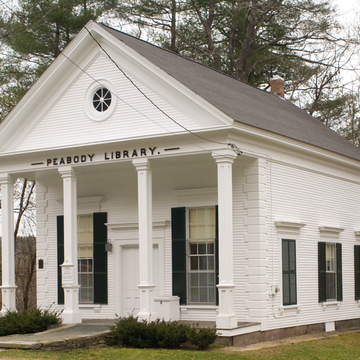This oldest purpose-built library in the state stands frozen in time as a testament to the simple roots of one of America's great philanthropists. A teenage George Peabody spent a winter with his maternal relatives in Post Mills before setting forth on the international banking and philanthropic career that would lead to residency in London, the founding of what would become the J. P. Morgan Company, and the establishment and support of important museums and libraries, including institutions in Salem, Cambridge, and Baltimore. Of six Peabody Institute libraries, the one he gave to Post Mills along with eleven hundred books selected by his dealers in London is the smallest.
Organized as a one-and-a-half-story Greek temple, the library is three bays deep. The 1860s were late for Greek Revival and emerging Italianate tastes are evident in the detailing of the originally two-color exterior. The recessed portico is fronted by slender posts on tall paneled plinths, and beveled wooden quoins mark the building's corners. Window frames rise from small consoles beneath their sills to boldly projecting heads. The double-leaf door is framed by a torus molding that supports a dentiled entablature. Inside, book stacks with molded cornices are set perpendicular to the side walls and line a narrow three-sided mezzanine decorated with ro settes and scrolls and carried on massive open-work brackets manufactured by the J. J. McNutt Novelty Wood Products Co. of Boston. Other than new paint and roofing, little has changed about this village library, which is now a National Historic Landmark.















